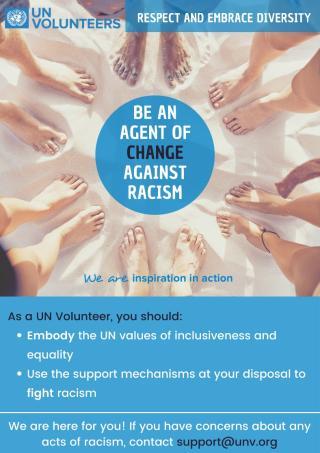Your first month
You should be feeling more comfortable by now and ready to take on more responsibility - show eagerness to demonstrate your ability to deliver on assigned goals. Continue introducing yourself to and building rapport with colleagues and peers across all levels to better understand the organization culture. You should feel well introduced to the system and integrated as part of the team.
Here are some suggestions on how to advance your integration and engagement at the workplace during the first months including points to discuss with your supervisor at the end of the first month.
-
1. Seek guidance and step up your work
-
Attend recurring one-on-one meetings with your supervisor to discuss your workplan deliverables and progress.Familiarize yourself with the Host Entity’s strategic plans, as well as key initiatives and developments in your area.Discuss how you are fitting in or having difficulty in understanding your role and what can be done to resolve it.Request support and guidance from supervisor and colleagues on tasks that are new and/or challenging.Ask questions, observe, and listen to learn job-specific processes and desirable behaviours from supervisor and other staff.
- 2. Seek and provide feedback proactively
-
Request for informal (and formal) feedback on your performance to date, your strengths, areas of improvement, and actions to address skill-gaps.Share insights, ideas, and feedback to transfer knowledge to the workplace.Tip: Seize opportunities to share ideas. The longer you wait, the faster you will forget transferable knowledge and skills from previous assignment.
- 3. Discuss learning and performance together
-
Create a learning and development plan together with your supervisor. Ask them to refer to UN Partners Toolkit on how to support your learning during assignment.Explore possibilities to learn informally and formally through Experience, Exposure and Education during your assignment.If possible, request your supervisor to “shadow” her/him at meetings and other relevant events to get exposure to others, and learn more about the department and organization.Understand the goal setting and volunteer performance appraisal process. Also consult the Host Entity on their performance evaluation process, criteria and evaluation form (if different) that will be used to evaluate performance.
- 4. Get connected and join a network
-
Find out what the local volunteers and volunteer organizations are doing in your duty station and join them by volunteering your time and skills.Young UN - open to all personnel regardless of age!UN Innovation Network – open to all innovators interested in sharing their expertise and experience with others to promote and advance innovation within the UN System.NewWork – only open to UN Secretariat personnel who want to find and drive solutions that helps the organization evolve.
- 5. Complete your other essential e-courses
-
Complete the other essential e-courses on eCampus if not already done. You have 3 months after arrival to do so. Else, risk losing access to UNV learning programmes.Keep certificates of completion for your record and spot check.You must update completion information to your UVP profile under "Other Qualifications".
- 6. Access UNV learning programmes for UN Volunteers
-
Access outstanding opportunities to learn and grow with UNV learning programmes for UN Volunteers.Watch this video or browse the interactive brochure for more information. Also check your eligibility here.Visit UNV eCampus to select self-paced online learning programmes that meet your needs today! See guide on how to apply for these learning opportunities.
- 7. Be a human rights champion! Fight Racism!
-
Your help is critical for the UN in creating a safe and dignified environment for all. Stand up against racial prejudice, disrespectful attitudes, and discrimination. Every day and everywhere.Visit the UN website – Fight Racism – understand the background and vulnerable groups, discover your biases, explore resources and more!Learn how you can get involved – engage, share, and teach – to #FightRacism. Also, register for the next Anti-Discrimination and Anti-Racism Dialogues. Share your experience with others!Become aware of the mechanism available to you to prevent, stop, and report misconduct including racial discrimination - complete the mandatory course on Know your Obligations and Rights today!

- 8. Learn how to manage stress and conflict effectively
-
Avail stress counseling services, free of cost, to empower yourself to navigate challenges and find support in a confidential environment. You have access to:
- Your host entity’s psychological counseling team - ask your host entity for contact details.
- CIGNA counseling services to combat stress and anxiety to build resilience.
- Or your local Critical Incident Stress Management Unit (CISMU) run by the UN Department of Safety and Security.
- Professional development coaching services by UNLOQ.
Take this online course from the Office of the Ombudsman for UN Funds and Programmes to learn about effective conflict resolution mechanisms in place if you have a conflict at the workplace.
- 9. Reflect and report on your experience and learning
-
Use the Volunteer Reflection Toolkit activities to understand and document your experience, learning, and achievementsIt includes practical activities to deepen understanding of the impact of your activities. Use it to document your learning and achievements, and eventually develop a comprehensive understanding of skills and competencies acquired during your UN Volunteer assignment.Make use of the Volunteer Reporting Application (VRA) regularly to record and report your contributions in terms of volunteer results, beneficiaries, added value, and trigger call for action on opportunities.It is an obligatory exercise for all UN Volunteers with a compulsory annual and end-of-assignment reporting. It also enables you to record information on your learning, personal and professional development, and satisfaction with the UNV assignment.

